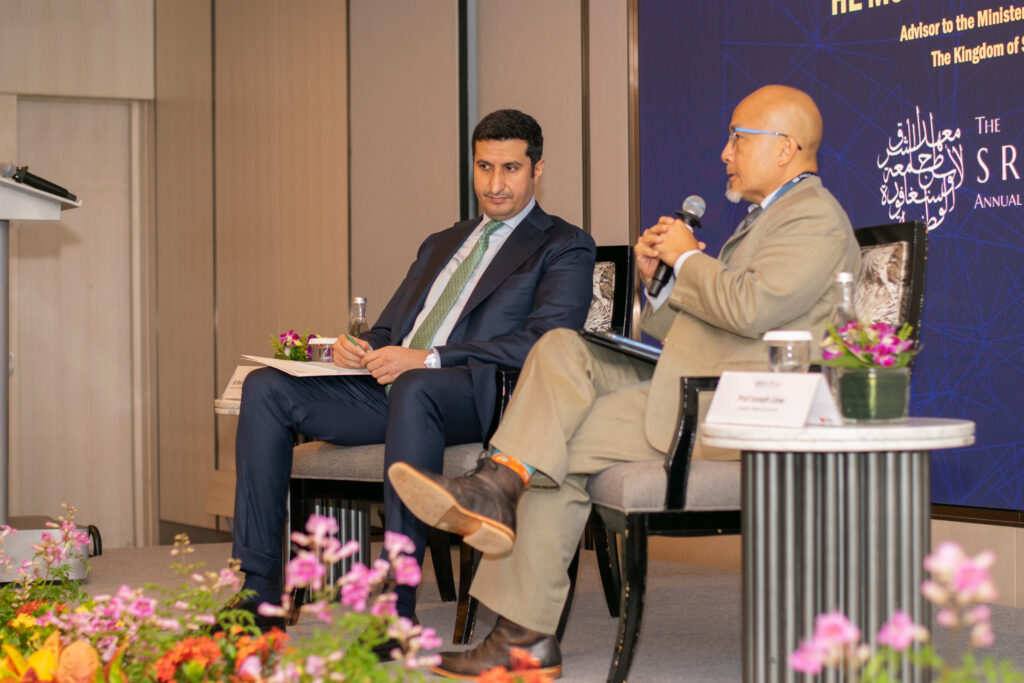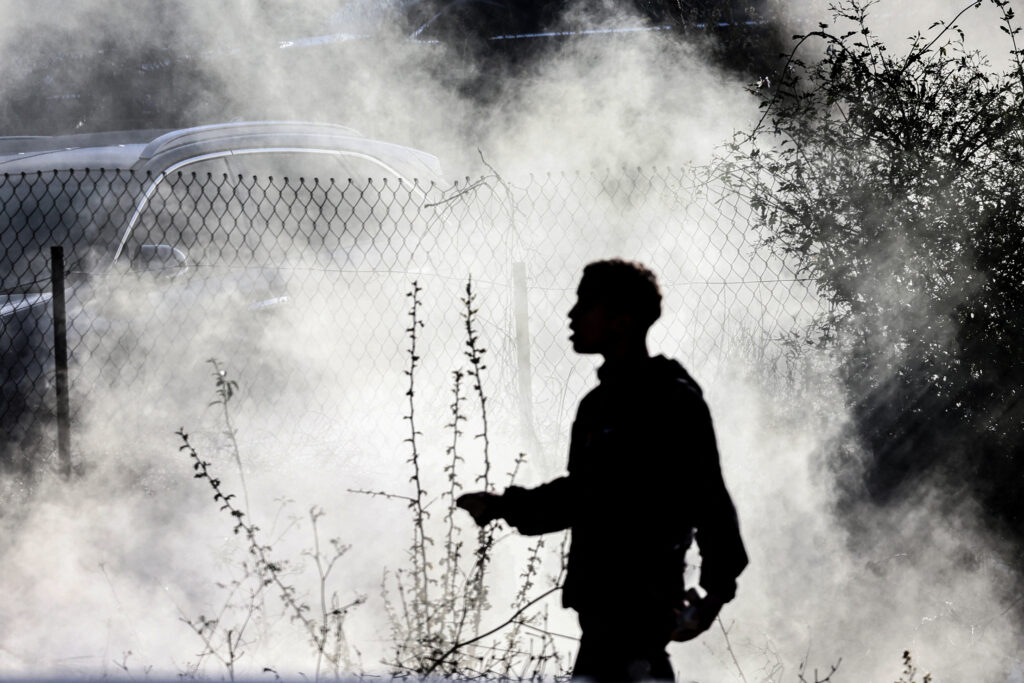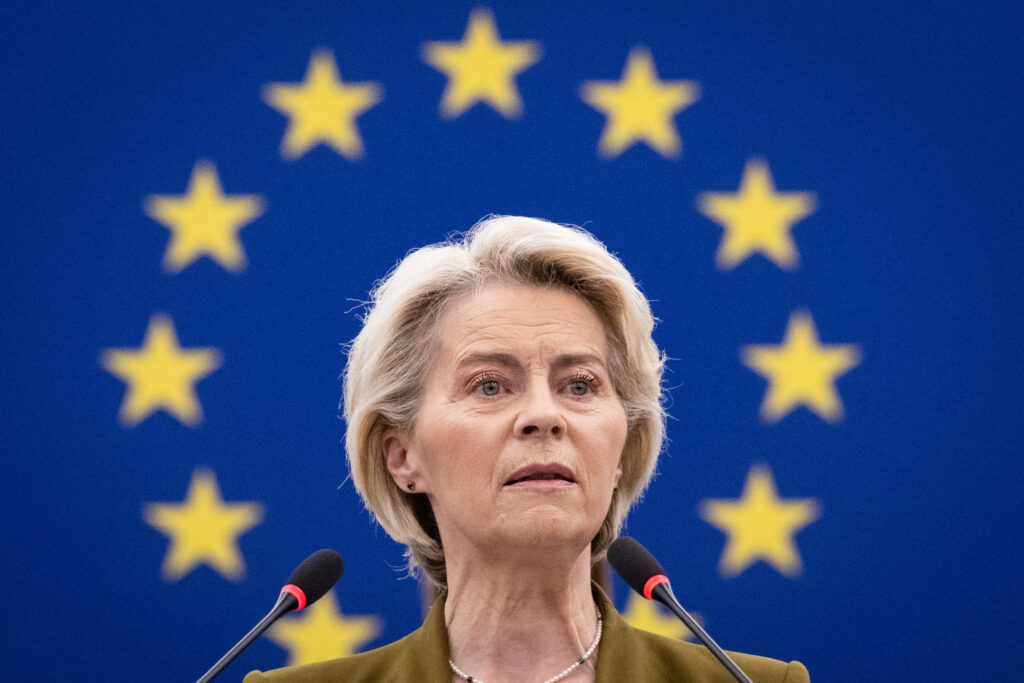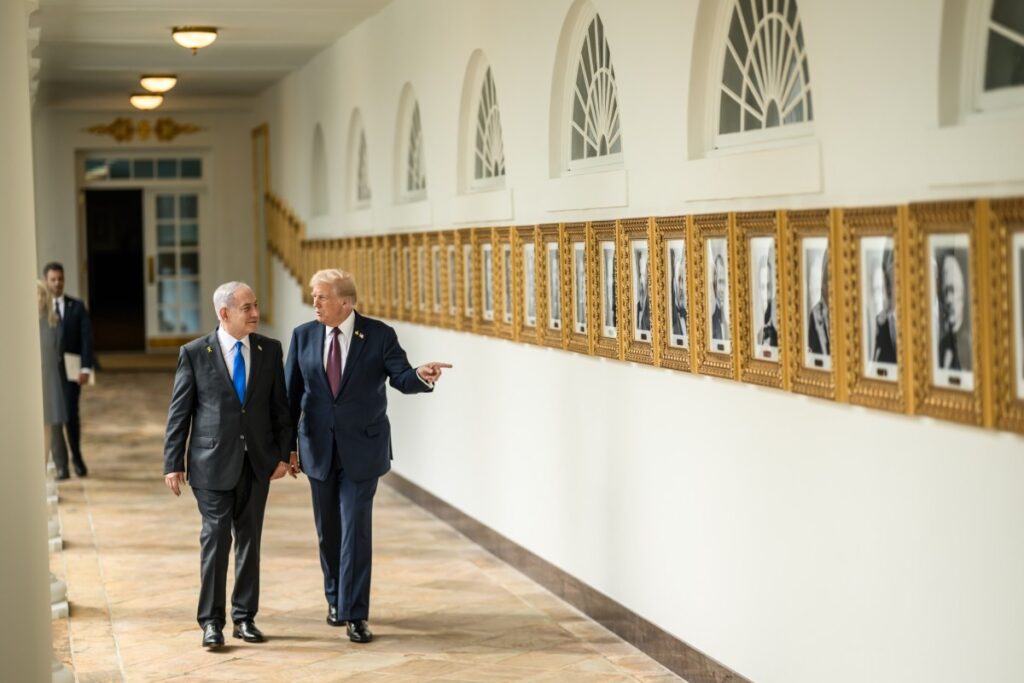How Covid-19 Brought Me Home Earlier Than Expected
- -

By Ofir Marer



My Singaporean experience summed up in three photos. From left: Sitting with my fellow students at the LKYSPP welcome event; enjoying some of the charms of the country, including Universal Studios Singapore; and the eerily deserted Changi Airport that was my last sight of the country.
Tel Aviv, Israel — Last year, when I decided to uproot myself and go to Singapore to study at one of the most prestigious universities in Asia, I did not anticipate that I would be returning home so soon. This time of the year, I expected myself to be busy with my studies at the National University of Singapore’s Lee Kuan Yew School of Public Policy, where I am pursing a Master in Public Administration.
Instead, it is barely April and I have been back in Israel for almost three weeks. Thanks to Covid-19, I was under quarantine for a full two weeks in a basement unit in my family home because I had just returned from abroad. Even after the mandatory 14 day quarantine, I have only been out of the house twice — once for grocery shopping and once for a short 100-metre walk around the block, the maximum distance allowed while Israel is in a state of semi-lockdown. What got me cheering recently was the government’s announcement that we are now allowed to venture as far as 500 metres from our homes!
The novel coronavirus pandemic, which has resulted in lockdowns all over the world, including Israel, has disrupted many plans, mine included. It has, however, also given me a travel experience I never expected and hope to never go through again.
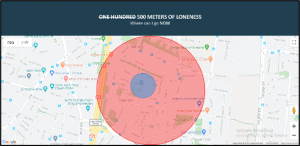

My first time basking in sunshine after 14 days of quarantine (right) and how far I can leave my home for exercise (left). The blue circle was the original 100m radius allowable, which was recently expanded to 500m.
Should I Stay or Should I Go?
As someone who had never been to Asia, going to Singapore last July took a lot of adjustment — from the climate to the cuisines to the languages, everything was a new experience. But I soon settled down and got to know my fellow students, who hailed from more than 15 countries, and were from both the public and private sectors.
Last November, a CNA report of a “new and yet unknown disease from Wuhan” was the harbinger of things to come. If not for my fellow classmates from China, I would not even have known of the existence of such a place.
I, like the rest of the world, did not take much notice of the new virus and carried on with my life as usual. In December, I went on a whirlwind tour of Asia. I made short trips to the Philippines, Hong Kong and Taiwan, followed by showing my family around Singapore on their maiden visit before heading off to Thailand for a family vacation. In February, I even managed to squeeze in a school trip to Hanoi, Vietnam.
That, alas, was the last trip I got to make. Soon, the coronavirus managed to smuggle itself out of China across the globe to South Korea, Italy and Singapore. At the beginning, the Singaporean government seemed to have the situation under control. My Singaporean friends told me about Asia’s experience with the Severe Acute Respiratory Syndrome (Sars) and how the government had vowed to be better prepared.
Indeed, other than the dozens of emails NUS sent about the various mitigatory measures it was taking, life went on as normal. Singapore was doing so well — no deaths, minimal community transmission — that my former colleagues in the Israeli Health and Defense Ministries got in touch to ask me what the secret behind the Republic’s success was as they tried to figure out how Israel should deal with this novel coronavirus.
It was not easy to explain to them that there did not seem to be a “magic formula”. Rather, it was a combination of clear preparation for handling pandemics, decisive and transparent government guidance, public outreach and the use of innovative technology to trace and contain the situation. Above all, the motto was to keep calm and carry on.
As the virus spread across the globe and the number of casualties went up, my parents, family and friends rang to ask if I was comfortable staying put. The answer was undoubtedly yes.
Even though the many incremental measures saw in-person classes replaced by e-learning and events were cancelled as social distancing became the norm, I still felt secure. Singapore was handling the situation promptly, and it seemed like it had everything under control. In fact, compared to Israel which had implemented a semi-lockdown in the middle of March, my life in Singapore was almost unbelievably more comfortable. Everything remained open.
But soon, the skies started closing everywhere. What started off as an entry ban on Chinese visitors quickly evolved into a worldwide ban on foreign travellers. Countries were devoted to taking care of their own and foreigners were not welcome due to the fear of contagion.
In Singapore too, fear started to take root among the population as the number of new cases continued to climb. People started panic-buying and stockpiling on essentials. Even though I felt secure and comfortable in Singapore and had a student pass that was still valid for months, the idea of being stranded in a country that was not mine began to give me pause for thought.
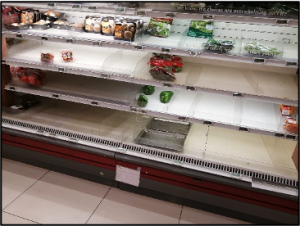
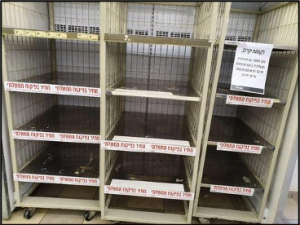
Panic buying in Israel (right) and Singapore (left) left supermarket shelves barren of food supplies.
A few other factors made me contemplate whether to stay put or go. One was a letter from NUS stating that it would help me in whatever ways it could if I decided to return home, including providing full e-learning modules for me to complete my degree. However, if I chose to stay, it would be at my own risk. Multiple foreign friends decided to leave Singapore earlier than expected.
The final straw came when I received a phone call from the Israeli embassy in Singapore suggesting that I leave while it was still possible, as there was only so much the Israeli government could do to help citizens like me in a foreign land during this global crisis. Coupled with yet another phone call from my mum (strongly) suggesting that I get myself home, I finally decided on 25 March to cut my Singaporean sojourn short.
Even though I made the decision to leave, it was no mean feat finding a flight home. Despite the friendly relations between Singapore and Israel, there were no direct flights between the two countries. For a few hours, I looked online, checked with travel agencies and even tried pulling some strings with the embassy (no luck there) to find a way home via the fastest and safest route.
In the end, my best bet was a flight with a layover in London, of all places. Since all other connecting destinations like Russia and Thailand were closed, and beggars can’t be choosers, I found the courage and booked the flight. In two days’ time, I would be flying out.
The frantic realisation that came over me in those first 10 minutes after I booked the flight was unbelievable. How would I even start? What should I do? Who do I approach? How do I tell my friends that I’m leaving? And what would happen to all my initial plans?
To cut a long story short, I packed everything I had, leaving a lot of stuff behind (including a week’s worth of groceries that I had bought the previous night after the government announced it would commence a month-long “circuit breaker” where offices and schools would be closed and movements restricted), and started telling people.
Support from my friends and colleagues at NUS and the Middle East Institute was unbelievable. I managed to talk to most of them and found some sort of closure which came much sooner than anticipated. I was overwhelmed as I found yet another proof that the friendships made during my time in Singapore would not be lost, and that we could continue the journey together, even if from afar. It was then that I started questioning myself (again) whether leaving was the right move. Was leaving really something that I should do, or should I maybe consider staying a couple more weeks or perhaps months?
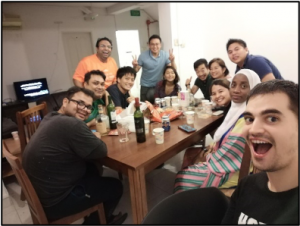
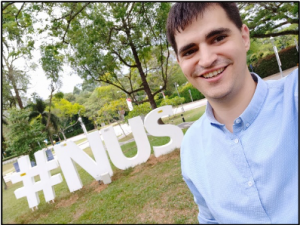
A we-fie with my classmates who hail from more than 15 countries (left) and a final selfie at the school that I was bidding goodbye to prematurely.
But, 27 March, the day of the flight, arrived. With a (temporary) goodbye to everyone I had met in Singapore, I made my way to the airport. It was going to be a long 27-hour flight (including the layover) home. Equipped with an N95 mask and lots of snacks in case the in-service meals were disrupted due to the ongoing global crisis (they were!), I got a ride from one of my Singaporean friends and went to Changi Airport.
Four suitcases with me, I entered the empty airport in disbelief. Only three counters out of the more than four dozen were operating. The departures board showed only five flights in the next 12 hours, one of which was mine. Devoid of the never-ending queues, crowds and bustling shops, it bore no resemblance to the big and impressive airport that I fondly remembered travelling in and out of multiple times. In its place was big and deadly quiet space with all the shops shuttered, no cacophony of travellers excitedly chatting about their travels. This, coupled with a weird-looking man in masks and robes, made it all the more unreal.
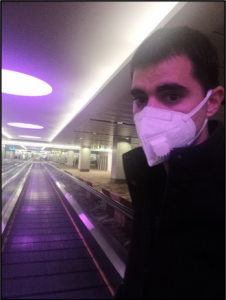
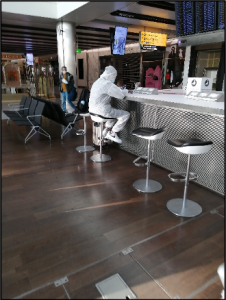
The new normal: deserted airports in Singapore (left) and the UK (right).
A couple hundred other travellers and I had the entire terminal to ourselves. As someone who was used having to arrive extra early to clear all the security checks (at least three hours before!), I found myself with nothing to do except sit next to the departure gate and contemplate the past couple of weeks, an unbelievable period that had changed my way of life so unexpectedly.
As I boarded the plane, almost all the seats were empty. Everyone else on board was like me, non-Singaporeans who were trying to “escape” the city-state. I kept my mask on for the duration of the 13-hour flight to London and tried to stay away from the other passengers.
I was really afraid to land in London, since it was a known hub for the virus with a huge number of cases. My greatest fear the whole time there was that my flight to Tel Aviv would be cancelled and I would end up having to spend the night (or nights) there. A year ago, spending a night in the British capital would have been a dream come true, but at that stage, I just wanted to get out of there as quickly as possible.
Like Singapore, all the shops at Heathrow Airport were closed and there were hardly any travellers in the airport. But in stark contrast to the Singapore I left behind, everyone had masks on their faces, and some people even had full-body robes. It seemed that was greater palpable sense of fear than in Singapore.
‘Welcome Home, Now Go and Get Yourself Quarantined Please’
After a gruelling almost 30-hour journey and three days of constant fear that something was going to go wrong, either with my flights home or that the authorities would discover a positive case in my hostel, I finally arrived home.
The Ben Gurion Airport in Tel Aviv, too, looked almost abandoned. My flight was the first arrival of the day, with only two more to follow. The airport closed a few days later, making me realise how narrow the window to return was. My luggage arrived safely (even if a bit shaken), and after submitting a written statement that I was healthy with no fever (I had had almost three months of daily temperature checks, thanks to NUS’s policy) and a promise I would stay in strict quarantine for 14 days, I was allowed to enter the country.
The two weeks passed in a blur as I kept busy by continuing with my schoolwork, including waking up at 3.30am (due to the five-hour time difference) twice a week for a 9am class back in Singapore. I also continued to keep in contact with the close friends that I made back in school from all over Asia and the world.
This was not the adventure I had in mind when I first arrived in Singapore eight months ago. No one could have predicted it. No one could have known that Covid-19 would disrupt our lives so significantly and would continue to do so for the next few months or maybe even years.
But that is not to say that it was all bad. I now have a once in a lifetime experience to share with my family and friends of my “escape from Singapore”. How I packed all my belongings in two days and hopped on a plane while fearing that I would get infected. Of course, I also have the memories of the wonderful time I had in Singapore, getting to travel around Asia and getting to know more about the region as well as its people.
My story with Singapore is not over yet, and I believe many chapters will still be written in the near and not-so-distant future. All I have to do is to count the days until this Covid-19 pandemic blows over and I can start planning the next phase. In the meantime, I can only imagine what could have happened if this pandemic never happened.
About the Author
Mr Ofir Marer is a post-graduate student pursuing a Master in Public Administration at the National University of Singapore’s Lee Kuan Yew School of Public Policy. He also worked part time at the Middle East Institute, NUS. Before taking the plunge to become a student again, he was a public servant in Israel for 12 years. He served in the Israeli Ministry of Health as the head of Policy and Regulation (Digital Health Department) and also in the Israeli Defense Forces, in multiple positions as a (reservist) Major (Intelligence and Planning Directorates).
Image caption: A deserted Heathrow airport in London, UK. Photo: Ofir Marer.


